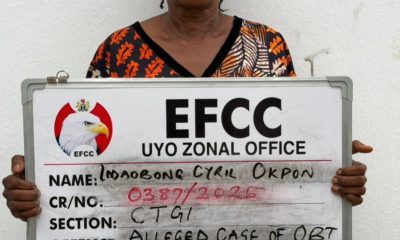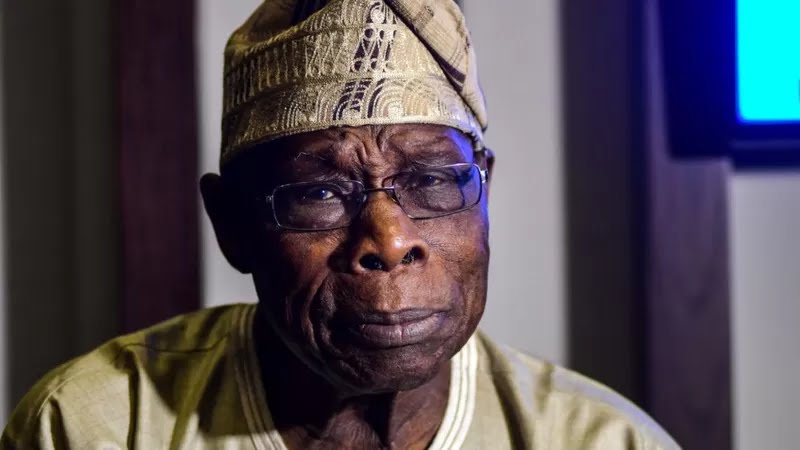Business
Customs intercepts N921bn worth of contraband at Apapa Port

The Comptroller-General of the Nigeria Customs Service (NCS), Bashir Adeniyi, on Wednesday, announced the interception of contraband items worth over N921 billion as the service intensifies enforcement operations at the nation’s ports.
The items included expired food items, unregistered pharmaceutical products and controlled security equipment.
Adeniyi during a press briefing at the Apapa Command of the service said that the seizures were made between January and April.
According to him, the seizures also involved 11 separate interdictions.
He said the prohibited items included five 40-foot containers, two 20-foot containers and four seizures of loosely concealed contraband.
The CG also gave updates on the rollout of the Customs Unified Management Information System, known as B’Odogwu, describing the pilot phase at PTML and Tin Can Island Port as crucial.
He explained that his earlier visits to PTML and Tin Can that morning, before arriving at Apapa, were to gain firsthand insights of challenges faced by stakeholders with the new digital platform.
He admitted that while the B’Odogwu rollout was ambitious and necessary, the service was fully aware that initial implementation would have some hiccups.
“We are not pretending that when we roll out a very serious project of that magnitude that there will be no hitches,” he said.
He added that Customs was approaching the situation with flexibility and innovation, holding stakeholder and bank engagements to address the hiccups in the system’s deployment.
Adeniyi also explained measures towards strengthening enforcement at the Apapa Command, in line with the national strategic economic development plan and executive orders on port operations.
He said the Command had scaled up surveillance across seaports, airports, and land borders in response to evolving tactics by transnational criminal networks attempting to breach the country’s import protocols.
He raised alarm over the rising influx of unregistered pharmaceutical products, particularly sexual enhancement drugs into the Nigerian market, warning that such items posed threat to public health and safety.
Unregistered medicines lacking mandatory certification from the National Agency for Food and Drug Administration and Control (NAFDAC) were seized.
Other items seized included expired margarine products, and restricted security gadgets including drones and telecommunication devices without end-user certificates from the Office of the National Security Adviser.
The seizures included 89 cartons of unregistered pharmaceutical products in container CAAU6514500, 242 cartons in container TCNU6880130, and 1,001 cartons of hydra-sildenafil citrate tablets in container MRSU3041714.
Another 40-footer container was found to contain 1,400 packages of various unregistered drugs, while a fifth had 805 packages falsely declared as cosmetic powder.
The service also intercepted two 20ft containers, GCNU1367992 and GCNU1372704, containing expired margarine products.
Additionally, 60 units of warrior drones without valid end-user certificates were recovered from container MSKU9329923, valued at N15.9 million.
Another 53 helicopter drones, evacuated from a container marked CFAX3, carried an estimated duty-paid value of N2.1 million.
Ten professional FM transceiver walkie-talkies were also confiscated from ENL, while a 20ft container (SUDU1408819) was found to contain 500 packages of active medicine tablets lacking NAFDAC certification.
Adeniyi disclosed that the analysis of these seizures revealed five key smuggling trends.
According to him, first was the disturbing proliferation of sexual enhancement drugs, as five of the 11 containers seized were laden with variants of sildenafil citrate and other related substances.
The CG warned that the indiscriminate use of these drugs without medical supervision could lead to serious health complications, including cardiovascular risks.
He said a second trend was a growing pattern of misdeclaration, with importers labeling pharmaceuticals as general merchandise or cosmetics in an attempt to evade detection.
According to him, two containers had pharmaceutical products concealed beneath skin creams.
He noted a third trend is the diversification of contraband shipments, with importers mixing pharmaceuticals, expired food, and restricted technology items in a single container.
This, he said, suggested the involvement of sophisticated criminal networks rather than isolated smugglers.
He said the fourth trend was the strategic selection of countries with weaker pharmaceutical export controls, indicating a deliberate attempt to exploit regulatory loopholes.
He identified the last trend of increasing importation of non-pharmaceutical security threats, including drones and communication gadgets, which raised significant concerns for national security.
The CG emphasized that the seizures were not isolated efforts but part of a broader enforcement drive that had seen the service record 22 narcotics-related interceptions in the first quarter of 2025 alone.
He added that the seizures accounted for a duty-paid value of N730 billion, representing 34.6 percent increase when compared to the same period in 2024.
He credited the results to the service’s intelligence-led enforcement strategy and collaboration with regulatory agencies like NAFDAC, Nigeria Drug Law Enforcement Agency and Office of the National Security Adviser.
Adeniyi warned that the service would not relent in its commitment to securing Nigeria’s borders and protecting the lives of its citizens.
He commended officers and men of the Apapa Command for their vigilance and professionalism, urging stakeholders within the international trade ecosystem to comply strictly with import regulations.
Concluding the briefing, the CG declared a restricted area around the five containers carrying dangerous pharmaceutical materials, urging all present to maintain a safe distance to avoid any risk of exposure.
He urged the public to remain alert and make use of confidential channels to report suspicious imports, emphasising that collective vigilance would curb the growing threat of organised transnational smuggling.
His removal, according to the statement, was allegedly based on non-compliance with the Bendel State Legal Notice 132 of 1979, guiding traditional succession.
Business
Dangote Cement reports 165% surge in EPS, reinforces Market Leadership across Africa

Dangote Cement Plc has announced robust financial results for the nine months ended September 30, 2025, showcasing a remarkable 164.8 per cent increase in earnings per share (EPS), which rose from ₦16.55 to ₦43.80.
This significant growth reflects the company’s strong operational performance and strategic expansion efforts.
Group revenue climbed by 23.2 per cent, reaching ₦3,154.8 billion compared to ₦2,560.6 billion in the same period of 2024. The company also recorded a 57.7 per cent rise in Group EBITDA, which grew from ₦908.7 billion to ₦1,428.2 billion. Profit after tax (PAT) surged by 166.3 per cent, from ₦279.1 billion to ₦743.3 billion.
EPS, a key indicator of profitability and shareholder value, continues to be a central metric in Dangote Cement’s financial reporting, reflecting the company’s commitment to delivering returns to investors.
A major contributor to this performance was the commissioning of a new 3Mta grinding plant in Côte d’Ivoire, which expanded Dangote Cement’s total installed capacity to 55Mta across Africa. This strategic move reinforces the company’s leadership in the continent’s cement industry and supports regional self-reliance.
Commenting on the results, Arvind Pathak, Chief Executive Officer of Dangote Cement, stated:
“The commissioning of our 3Mta Côte d’Ivoire grinding plant marks a significant milestone in our growth journey. It strengthens our position as Africa’s leading cement producer and underscores our commitment to regional self-reliance.”
Pathak attributed the revenue growth to proactive management strategies and resilient market demand. He highlighted the success of efficiency programs and disciplined cost management, particularly in Nigeria, where a more favorable energy mix helped reduce cash costs. Exports from Nigeria increased by 23 per cent, driven by 27 clinker shipments to Ghana and Cameroon.
He also emphasized the company’s sustainability initiatives, including the phased deployment of 1,600 CNG-powered trucks aimed at reducing logistics costs and carbon emissions. Progress on the Itori Integrated Plant is also underway, expected to boost domestic capacity and open new export opportunities.
Looking ahead, Pathak added: “Our focus remains on sustaining earnings momentum, enhancing operational efficiency, and executing our long-term growth strategy. With a clear strategic direction and a strong balance sheet, Dangote Cement is well-positioned to continue delivering superior value to stakeholders.”
Earlier in the year, for the six months ended June 30, 2025, Dangote Cement reported a 17.7 per cent increase in revenue to ₦2,071.6 billion—the highest in its history. Group EBITDA rose by 41.8 per cent to ₦944.9 billion, while Nigeria operations saw an 82.4 per cent increase to ₦845.4 billion. Profits before tax jumped by 149 per cent to ₦730 billion, and PAT soared by 174.1 per cent to ₦520.5 billion.
Dangote Cement remains Africa’s largest cement producer, with a fully integrated quarry-to-customer model and a production capacity of 35.25Mta in Nigeria alone. Its facilities include: Obajana Plant (Kogi State): 16.25Mta across five lines; Ibese Plant (Ogun State); 12Mta across four lines; Gboko Plant (Benue State): 4Mta; Okpella Plant (Edo State): 3Mta
Through strategic investments, the company has eliminated Nigeria’s reliance on imported cement and transformed the country into a net exporter of cement and clinker.
Dangote Cement also operates across several African countries, including: Cameroon, Congo, Ghana, Ethiopia, Senegal, Sierra Leone, South Africa, Tanzania, Zambia and Côte d’Ivoire.
Business
Nigeria raises $2b to boost renewable energy, power sectors – Adelabu

The Minister of Power, Chief Adegoke Adelabu has said that over $2 billion has been raised through to accelerating renewable energy deployment and expand reliable, affordable power across Nigeria.
At the Nigeria Energy Forum 2025, holding in Lagos, the Minister said that Nigeria has been advancing its energy transition and access goals by ‘leveraging bilateral funding and development finance to de-risk investments and attract private participation for access expansion across underserved and unserved communities, educational institutions, healthcare facilities and government institutions’.
Adelabu further said: ‘In the past two years, over $2 billion has been mobilised through key facilities, including the $750 million World Bank DARES (Distributed Access through Renewable Energy Scale-up) programme for off-grid and mini-grid expansion, the $500 million NSIA RIPLE (Nigeria Sovereign Investment Authority’s Renewables Investment Platform for Limitless Energy) platform to unlock private capital for renewables, and the $190 million JICA (Japan International Cooperation Agency) fund to complement DARES. Collectively, these interventions are accelerating renewable energy deployment and expanding reliable, affordable power across the country’.
He said that Nigeria now has over 10 GW of stranded generation capacity, explaining that this is energy that could power industries, create jobs, and support electricity exports to the neighboring countries through the regional power pool.
‘We are therefore open to strategic partnerships to mobilise the necessary investments and unlock this potential. Our market fundamentals are improving, our policy environment is clear, and the national leadership is committed to creating the enabling conditions for long-term investment and innovation’, Adelabu told his audience.
He spoke of Nigeria’s aspiration, along with its partners, ‘to build a resilient, inclusive, and sustainable energy future’. Such a move, the Minister further said, ‘speaks not only to the urgent need for capital infusion but also to the transformative role of collaboration, especially with the private sector in driving progress’.
He said that the Federal Government is pursuing a comprehensive, multi-pronged approach to reposition the Nigerian power sector for sustainability, efficiency, and growth. ‘This approach spans critical pillars which include legislation, policy reforms, infrastructure development, energy transition and access expansion, and local content and capacity development with each designed to address structural challenges, unlock private capital, and enhance service delivery across the electricity value chain’, Adelabu said.
He pointed at the enactment of the Electricity Act 2023 as a major milestone, which provides a robust governance and regulatory framework for the Nigerian Electricity Supply Industry.
The Minister said that one of the essence of the Act is that it devolves regulatory powers to the states, enables subnational markets, promotes competition, and empowers private participation across the value chain.
‘This represents a clear shift towards a liberalised and investment-friendly electricity market. Since its passage, 15 states have received regulatory autonomy to establish subnational electricity markets with one fully operationalised. We are working actively with these states to ensure strong alignment between the wholesale market and the retail market. In this regard, we believe the active involvement of state governments, particularly in the off-grid segment is critical, given the series of roundtable engagements held with governors by the Rural Electrification Agency, as well as the ongoing efforts to closely track the Distribution Companies’ performance within their respective jurisdictions’, he said.
He said that the development of the Integrated National Electricity Policy, initiated by his Ministry and approved by the Federal Executive Council last February, ‘marks the first comprehensive, sector-wide policy framework in nearly two decades, and we deeply appreciate the industry experts and development partners many of whom are here today for their invaluable contributions in achieving this milestone’.
Adelabu told the Forum that the Nigerian government is deepening power sector commercialisation to strengthen revenue, liquidity, and investor confidence. He added: ‘Through tariff policy reforms, which enabled cost-reflective tariffs for select consumers, supply reliability has improved while reducing energy costs for industries, and industry revenue has increased by 70% to N1.7 trillion in 2024 compared to previous year and the revenue is expected to exceed N2 trillion for 2025.
‘To stabilise the market, Mr. President has approved a N4 trillion bond to clear verified GenCo (electricity generating companies) and gas supply debts. Alongside this, a targeted subsidy framework is being developed to protect vulnerable households and ensure a sustainable path toward full commercialization and viable industry’.
He said that the Federal Government has operationalised the Presidential Metering Initiative (PMI) to close the national metering gap and improve sector viability.
According to the Minister,N700 billion has been secured from FAAC (Federation Accounts and Allocation Committee) to deploy 1.1 million meters by end of 2025, and two million annually over the next five years under the PMI.
‘This complements the 3.2 million meters being procured through the World Bank’s DISREP program, positioning Nigeria to close the metering gap within five years and strengthen transparency and revenue assurance across the value chain’, he said.
Business
FG unveils N10m excellence award for tax reform reporting

The Presidential Fiscal Policy and Tax Reforms Committee has announced the unveiling of the Excellence in Tax Reform Reporting Award to honour journalists and digital influencers who demonstrate accuracy, balance, and impact in covering Nigeria’s ongoing tax reforms.
The announcement was made via X on Tuesday by the chairman of the committee, Mr. Taiwo Oyedele.
Oyedele said that the initiative aims to promote constructive public discourse, counter misinformation, and support journalism that helps citizens better understand and trust fiscal reforms.
According to him, the award is open to Nigerian journalists across print, broadcast, and online platforms, as well as digital influencers, bloggers, and podcasters.
‘The award seeks to strengthen constructive public discourse, counter misinformation, and elevate journalism that explains reforms in ways citizens can trust and understand’, Oyedele added.
He explained that entries must consist of published works between 1 July and 31 December, 2025, in English, Pidgin, Hausa, Igbo, or Yoruba.
On the award structure, Oyedele said prizes include ₦10 million for the overall winner, ₦5 million for the second-place winner, ₦3 million for the third-place winner, and consolation prizes for the top 20 finalists.
He added that entries will be judged based on accuracy, balance, clarity, public engagement, and creativity.
‘T𝐨 𝐀𝐩𝐩𝐥𝐲, applications will open via the official portal http://fiscalreforms.ng by 31 December 2025′, the statement stated.
The initiative aligns with the committee’s broader efforts to harmonise multiple taxes and levies into a simplified, broad-based system.
-

 Business5 days ago
Business5 days agoNigerian petrol marketers to dump Dangote Refinery for cheaper imported fuel
-

 News4 days ago
News4 days agoEFCC Arrests School Owner for Alleged Visa and Scholarship Fraud in Uyo
-

 Business5 days ago
Business5 days agoFuel landing cost drops, now cheaper than Dangote Refinery’s petrol price
-

 News4 days ago
News4 days agoTell Nigerians real reasons for sacking service chiefs – ADC to Tinubu
-

 News5 days ago
News5 days agoPolice arrest 12 cult suspects, recover weapons, vehicles in Osun
-

 Politics4 days ago
Politics4 days agoI rejected El-Rufai as my successor over immaturity – Obasanjo
-

 News5 days ago
News5 days agoPolice re-arrest Sowore moments after bail
-

 News4 days ago
News4 days agoFCTA to prohibit use of ambulances for transporting corpses
-

 Politics5 days ago
Politics5 days agoI remain SDP National Chairman – Gabam
-

 News4 days ago
News4 days agoPolice arrest four over alleged murder of man lured by girlfriend in Sokoto
-

 News5 days ago
News5 days agoStudent arrested in Niger for allegedly criticising Gov Bago







